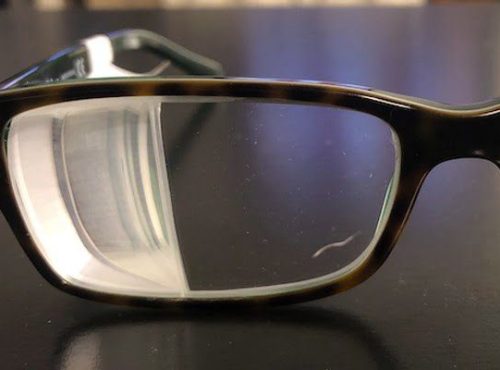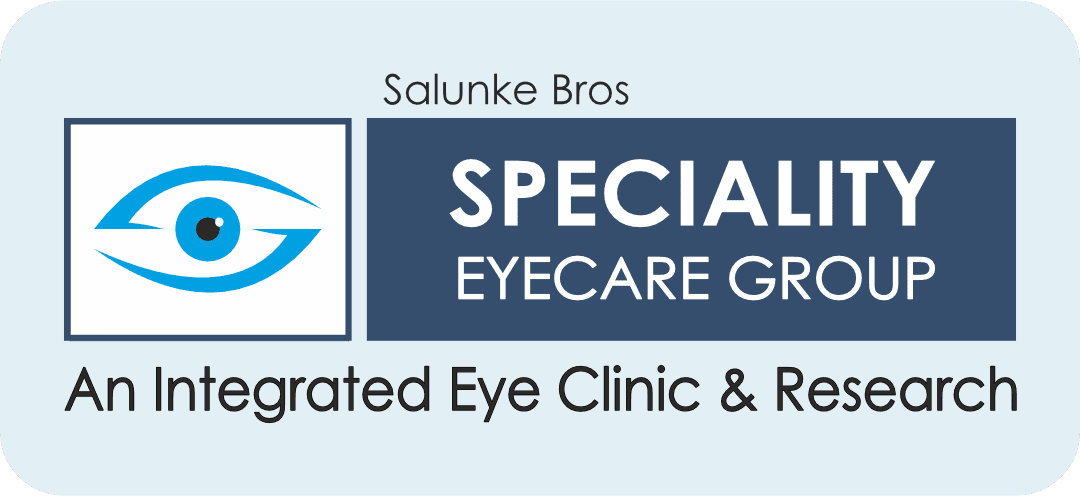Prism Trail For Diplopia

What is Diplopia?

At Speciality Eyecare Group, Pune, we offer specialized diagnostic and corrective solutions for managing diplopia (double vision), including prism trials, Fresnel prisms, and ground-in prisms. These tools are essential for accurately diagnosing and effectively treating diplopia, providing improved visual comfort and functionality.
Diplopia, or double vision, occurs when a person sees two images of a single object. It can be caused by a variety of factors, including:
- Eye Muscle Imbalances: Conditions such as strabismus or other muscle disorders
- Neurological Disorders: Issues affecting the nerves that control eye movements
- Refractive Errors: Uncorrected vision problems that contribute to double vision.
- Injury or Trauma: Damage to the eyes or surrounding structures.
Prism Trial for Diplopia
Prism trials are essential for diagnosing and determining the appropriate prism strength to alleviate diplopia. The process includes:
Initial Evaluation:
Comprehensive Eye Exam: Assess the severity and nature of the diplopia through various visual tests.
Patient History: Collect information about the onset, frequency, and associated factors of the double vision.
Prism Trial Process:
Trial Prisms: Use a range of trial prisms with different strengths to find the optimal correction for the diplopia.
Patient Feedback: Adjustments are made based on how well the prisms reduce or eliminate the double vision.
Final Prescription: Once the most effective prism strength is identified, a prescription for custom lenses or glasses is provided.
Prism Trial Process:
Custom Lenses: Based on the trial results, custom prism lenses are prescribed.
Follow-Up Care: Regular follow-ups ensure the prisms remain effective and comfortable.
Ground-In Prisms

Ground-in prisms are prisms that are incorporated directly into the lens during its manufacturing process. They offer a permanent and often more stable solution for managing diplopia.
Key Features of Ground-In Prisms:
- Permanent Solution: Integrated into the lens for long-term use.
- Custom Fit: Precisely ground into the lens to match the patient’s specific requirements.
- Durability: Provides a stable and reliable solution for managing diplopia.
Benefits of Ground-In Prisms:
- Enhanced Stability: Less prone to shifting compared to Fresnel prisms.
- Seamless Integration: Integrated into the lens for a more aesthetically pleasing and comfortable fit.
- Long-Term Effectiveness: Ideal for patients requiring a permanent solution for diplopia.


Fresnel Prisms

Fresnel prisms are thin, flexible prisms that can be easily applied to the surface of eyeglasses. They provide a temporary or adaptable solution for managing diplopia.
Key Features of Fresnel Prisms:
- Lightweight and Flexible: Easy to apply and adjust on existing glasses.
- Cost-Effective: More affordable compared to traditional prism lenses.
- Customizable: Available in various strengths and configurations.
Benefits of Fresnel Prisms:
- Quick Adjustment: Can be easily repositioned or removed.
- Convenient Solution: Provides immediate relief from diplopia.
- Adaptability: Suitable for both temporary use and adjustment during treatment.
The Process of Using Prisms
Initial Consultation and Assessment
Evaluation: Detailed examination to assess the type and severity of diplopia and determine the best prism option.
Discussion: Explore different prism options, including Fresnel and ground-in prisms, based on patient needs.
Fitting and Adjustment
Fitting: Ensure proper alignment and effectiveness of the prisms.
Follow-Up: Regular follow-up appointments to monitor the effectiveness and comfort of the prisms.

Prism
Application
Ongoing Support
Fresnel Prisms: Applied to the surface of existing glasses or trial frames for immediate adjustment.
Ground-In Prisms: Incorporated into new lenses during the manufacturing process for a permanent solution.
Monitoring: Continuous evaluation to ensure the prisms are providing the desired relief.
Adjustments: Making necessary adjustments for optimal performance.
Generally Asked Questions
What is a prism trial?
A prism trial involves using prismatic lens correction to assess and manage double vision. Prisms are optical devices that bend light and can be used to shift the image seen by one eye so that it aligns with the image seen by the other eye, helping to correct diplopia.
What can I expect during the testing process?
You will be asked to focus on an object while different prisms are placed in front of your eyes. The optometrist or ophthalmologist will adjust the strength and orientation of the prisms based on your feedback and their observations until your eyes align and the double vision is corrected.
What happens if my double vision changes over time?
Your prism prescription may need to be adjusted if your double vision worsens or improves. Regular follow-ups with your eye care provider are essential to monitor any changes and adjust your treatment as needed.
Can Ortho-K be used to correct other vision problems besides myopia?
Ortho-K is primarily used for myopia but can also correct mild astigmatism and hyperopia in some cases. However, it is most commonly prescribed for myopia control.
Request a Consultation
If you are experiencing diplopia and are interested in exploring prism trials or Fresnel and ground-in prisms, Speciality Eyecare Group, Pune is here to provide expert care and tailored solutions. Contact us today to schedule a consultation and discover how we can help alleviate your double vision.


